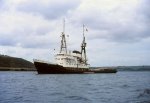Kukri
Well-Known Member
I remember with great fondness (not!) Mr Len Maynard of P&O Safety Services, who had been on board the “Amoco Cadiz”, advising the Italian crew on safety matters, on the 16th March 1978, telling the Liberian Formal Enquiry into her loss that “The tug wasn’t towing. It wasn’t trying to tow. The tow line never came out of the water!”
The Liberian Government was engaged in trying to become respectable at this time as far as it’s maritime operations were concerned and the Formal Enquiry was headed by Sir Gordon Wilmer, QC….
Gordon Willmer - Wikipedia
Sir Gordon thanked Mr Maynard for his evidence with great courtesy, and proceeded to show exactly what he thought of it.
The Liberian Government was engaged in trying to become respectable at this time as far as it’s maritime operations were concerned and the Formal Enquiry was headed by Sir Gordon Wilmer, QC….
Gordon Willmer - Wikipedia
Sir Gordon thanked Mr Maynard for his evidence with great courtesy, and proceeded to show exactly what he thought of it.
Last edited:

